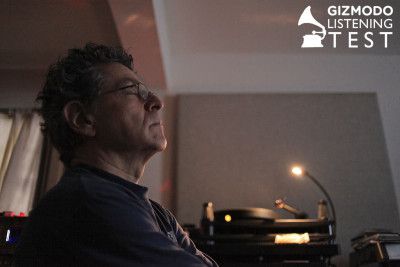From our front-page news:
In the past, some people have asked me if I was an audiophile, simply because I have a good set of cans, a good audio card, and also happen to stick to lossless formats for my collection. But, I'll be the first to admit that I'm the furthest thing from being an audiophile. Just reading a review like Rory's is enough to reaffirm the fact that I simply know nothing when it comes to quality audio.
You might feel like you don't to be an audiophile or have expensive equipment to enjoy music, and you're absolutely correct. But another good fact to realize is that even if we aren't audiophiles, we can thank those who are, since they're undoubtedly the reason that (affordable) audio equipment nowadays is so good, and not to mention music production in general as well.
Gizmodo believes we owe a lot to audiophiles, and came to realize this after paying a visit to Michael Fremer, an editor for Stereophile magazine. Although Michael has hundreds of thousands of dollars worth of equipment in his living room, he certainly doesn't believe that anything like that is required. In fact, he even states that folks who build a quality system for $3,000 - $5,000 are going to achieve "85" (out of a hundred) when it comes to overall audio quality. Getting those extra few percentage points and decimal places is not an inexpensive affair.
But would you believe that despite his equipment, he prefers music on vinyl? There's a few good reasons for it, and many true audiophiles feel the same way. And if you think that your 256 kbit/s audio is adequate, don't go talking to Michael about it! Indeed, audiophiles may be the fussiest people around, but it works out to our favor in the end, that's for sure.

We play my solid 256kbps VBR MP3 of "Heroes" off my iPod; it sounds like shit. Free of pops and crackles, yes, but completely lifeless, flat in every way. This is the detail that matters: Audiophiles are basically synesthesiacs. They "see" music in three-dimensional visual space. You close your eyes in Fremer's chair, and you can perceive a detailed 3D matrix of sound, with each element occupying its own special space in the air. It's crazy and I've never experienced anything like it.
Source: Gizmodo
You might feel like you don't to be an audiophile or have expensive equipment to enjoy music, and you're absolutely correct. But another good fact to realize is that even if we aren't audiophiles, we can thank those who are, since they're undoubtedly the reason that (affordable) audio equipment nowadays is so good, and not to mention music production in general as well.
Gizmodo believes we owe a lot to audiophiles, and came to realize this after paying a visit to Michael Fremer, an editor for Stereophile magazine. Although Michael has hundreds of thousands of dollars worth of equipment in his living room, he certainly doesn't believe that anything like that is required. In fact, he even states that folks who build a quality system for $3,000 - $5,000 are going to achieve "85" (out of a hundred) when it comes to overall audio quality. Getting those extra few percentage points and decimal places is not an inexpensive affair.
But would you believe that despite his equipment, he prefers music on vinyl? There's a few good reasons for it, and many true audiophiles feel the same way. And if you think that your 256 kbit/s audio is adequate, don't go talking to Michael about it! Indeed, audiophiles may be the fussiest people around, but it works out to our favor in the end, that's for sure.

We play my solid 256kbps VBR MP3 of "Heroes" off my iPod; it sounds like shit. Free of pops and crackles, yes, but completely lifeless, flat in every way. This is the detail that matters: Audiophiles are basically synesthesiacs. They "see" music in three-dimensional visual space. You close your eyes in Fremer's chair, and you can perceive a detailed 3D matrix of sound, with each element occupying its own special space in the air. It's crazy and I've never experienced anything like it.
Source: Gizmodo
